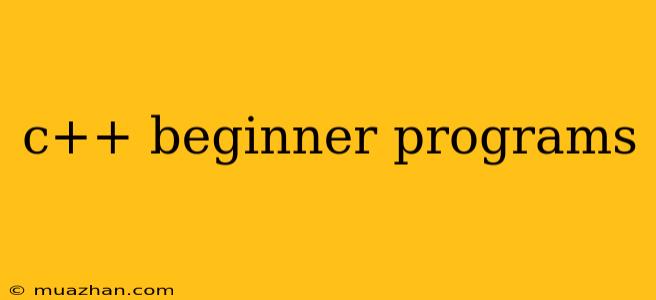C++ Beginner Programs: A Step-by-Step Guide
This article is designed to guide you through some fundamental C++ programs, perfect for beginners wanting to dip their toes into the world of programming. We'll cover simple concepts like printing to the console, taking user input, and basic arithmetic operations.
1. "Hello, World!" - Your First C++ Program
This classic program is the quintessential starting point for any programmer. Let's break it down:
#include
int main() {
std::cout << "Hello, World!" << std::endl;
return 0;
}
Explanation:
#include <iostream>: This line includes the input/output stream library, essential for interacting with the console.int main() { ... }: This defines themainfunction, the heart of your program where execution begins.std::cout << "Hello, World!" << std::endl;: This line prints "Hello, World!" to the console.std::cout: The standard output stream object.<<: The insertion operator used to send data to the output stream.std::endl: Inserts a newline character, moving the cursor to the next line.
return 0;: This indicates successful program execution.
2. Taking User Input
Now let's get interactive! This program takes a user's name and greets them:
#include
#include
int main() {
std::string name;
std::cout << "What's your name? ";
std::getline(std::cin, name);
std::cout << "Hello, " << name << "!" << std::endl;
return 0;
}
Explanation:
#include <string>: This includes the string library for working with text.std::string name;: Declares a string variablenameto store the user's input.std::getline(std::cin, name);: Takes the user's input from the console and stores it in thenamevariable.std::cin: The standard input stream.std::getline: Reads a line of input, including spaces.
3. Performing Basic Arithmetic
Let's write a program that performs simple calculations:
#include
int main() {
int num1, num2;
std::cout << "Enter first number: ";
std::cin >> num1;
std::cout << "Enter second number: ";
std::cin >> num2;
int sum = num1 + num2;
std::cout << "The sum is: " << sum << std::endl;
return 0;
}
Explanation:
int num1, num2;: Declares two integer variablesnum1andnum2to hold the numbers.std::cin >> num1;andstd::cin >> num2;: Takes the user's input and stores it in the corresponding variables.int sum = num1 + num2;: Calculates the sum of the two numbers and stores it in thesumvariable.std::cout << "The sum is: " << sum << std::endl;: Prints the result to the console.
Conclusion
These basic programs provide a solid foundation for learning C++. They introduce essential concepts like input/output, variables, data types, and simple calculations. As you build upon this knowledge, you'll unlock the power of C++ to create more complex and exciting programs.
Remember, practice is key. Experiment with different values, modify the programs, and try to solve simple problems using C++. Happy coding!
